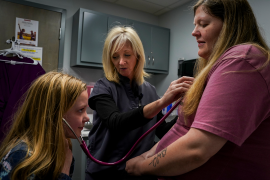In September 2023, the National Institute on Minority Health and Health Disparities designated disabled people as a health disparity population, signaling the possibility for increased research funding to investigate the widespread health inequities faced by a community made up of people with a diverse range of health conditions and identities, and the shared experience of systemic discrimination that hinders their full participation in society. Disabled adults are more likely to face unfair treatment — 32 percent of adults with disabilities report unfair treatment in health care settings, which disrupts care and delays needed supports. People with disabilities also experience discrimination in hiring and high rates of material hardships like unstable housing and food insecurity, which contribute to health disparities. These hardships extend to people with invisible and emerging disabilities, such as long COVID. Acknowledging these disparities and the detrimental effects of systemic discrimination is an important step toward creating more equitable policies for disabled people.
Improving Disability Measurement Is Critical
Equitable policymaking also requires an accurate picture of disability at the population level. Current estimates using the American Community Survey (ACS) report that 14 percent of the U.S. population — 44 million Americans — are disabled. However, this is likely an underestimate, as the six questions used to estimate the disability population only ask about functional limitations: difficulty hearing, seeing, remembering, walking, completing self-care, or doing errands. The questions can miss people whose disabilities are mitigated through access to services or supports, like mobility devices or psychiatric medications. Research also shows that many adults experience health-related activity limitations that are not captured by the standard questions. For instance, the questions do not always identify disabilities related to chronic physical and mental health conditions such as bipolar disorder, attention-deficit/hyperactivity disorder, autism spectrum disorder, long COVID, and autoimmune diseases, because these conditions limit daily activity intermittently or affect aspects of daily living not captured by the questions.
Underestimating the disabled population is likely to have material consequences. ACS data are used to inform public funding provision, enforce antidiscrimination protections, and evaluate public policies.
Looking Forward
Disability researchers are calling for the development of new questions to estimate the disabled population. Creating these measures will require a significant investment from researchers and the federal government to provide the sustained funding and dedicated time to design and test new and improved disability measures. Additional support from philanthropy would facilitate this process.
Importantly, developing new disability measures presents an opportunity to engage with the disability community — and include disabled people at all stages of the process, from the inception of new measures to testing and final decision-making. Researchers, policymakers, and health care providers can look to frameworks including disability pride, the neurodiversity movement, and the recovery movement for mental health, which have changed disability policy and practice and contributed to the growth of peer health workers, self-advocates, and community-based participatory research for people with disabilities. Now, in partnership with the disability community, researchers can test approaches to find comprehensive measures that incorporate current understandings of disability identity. This would align with the core tenet of the disability rights movement, nothing about us without us.




